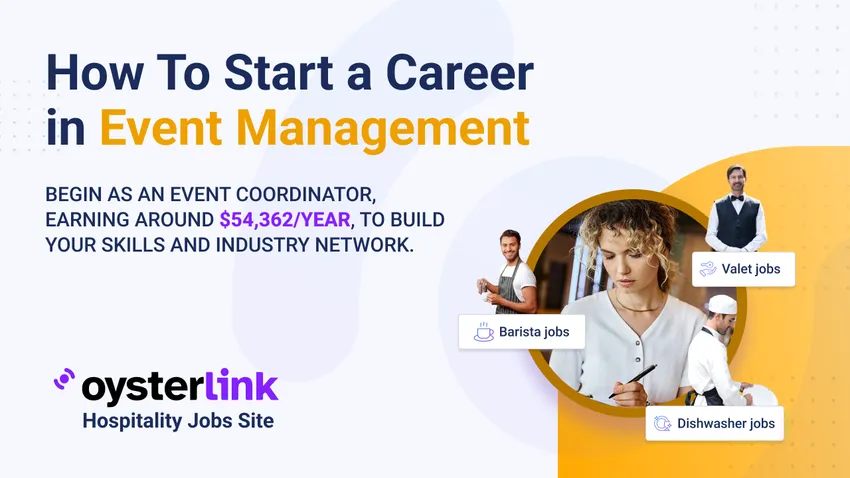Event management is one of the fastest-growing and most dynamic career paths in hospitality.
And with the global event industry expected to exceed $42.6 billion by 2034, there’s never been a better time to jump in.
Things To Consider When Starting Off in Event Management
Like any industry, event planning has its ups and downs. But if you’re a people person who thrives in fast-paced settings, you’ll likely love it.
However, the job comes with pressure, long hours, and multitasking. That’s why staying mentally and physically fit is key to thrive.
Understanding the Event Management Industry
The event management industry covers everything from corporate conferences and weddings to festivals and trade shows.
It applies project management to bring large-scale events to life. Knowing its scope helps you find your niche and specialization.
Roles in Event Management
To get into the field, consider becoming an Event Coordinator. To succeed in this role, you should have excellent organizational skills.
Even though Event Coordinator is usually considered an entry-level role, their role is crucial in preparing a successful event.
After spending a couple of years as an Event Coordinator, you will be eligible to become an Event Planner.
As an Event Planner, you will be tasked with responsibilities such as:
- Conducting market research
- Communicating with vendors, and
- Ensuring client satisfaction.
Ultimately, if you spend a lot of time in the event management industry, you will advance to an Event Manager.
This role demands exceptional attention to detail and the ability to oversee an event from inception to completion.
Specialized Roles in Event Management
Beyond the general roles, the event management field offers specialized positions that cater to specific event types and functions:
- Wedding Planner: Plans and coordinates every detail of a wedding
- Venue Manager: Manages event space operations
- Event Marketing Specialist: Promotes events to the right audience
Gaining Practical Experience in Event Management
Practical experience is invaluable in event management. Here are ways to gain hands-on experience:
- Help out as a volunteer at local events to see how things work
- Shadow an Event Manager to learn the ropes
- Join an event company as an intern to get real experience
How To Get Into Event Management With No Experience
Breaking into event management might seem daunting, but it's possible even without prior experience. Here's how to start:
1. Study marketing and public relations
Good PR campaigns play a major role in organizing a successful event. The best part is that these skills are 100% transferable to any job.
For example, if you’ve worked in sales, customer service, or project management, you already have a strong foundation.
2. Network with successful professionals
If you’re just starting out in the field, you can learn a lot about the industry from reputable professionals.
If you don’t know anyone in your surroundings, you can attend events or seminars where these experts meet.
Engaging with online communities and forums dedicated to event management can also provide valuable insights and connections.
3. Work towards obtaining a certification
Some reputable universities and industry organizations offer degrees in event management and you can also explore specialized courses.
Consider certifications such as the Certified Meeting Professional (CMP) or the Certified Special Events Professional (CSEP).
These certifications can provide a competitive edge and demonstrate your commitment to the profession.
Employers often prioritize candidates who have certifications, even if they lack experience. This can set you apart from other applicants.
Educational Pathways in Event Management
Consider the following options:
- Bachelor’s degree
- Diploma programs
- Certified Meeting Professional (CMP)
- Certified Special Events Professional (CSEP)
- Certified in Exhibition Management (CEM)
Top 5 Must-Have Skills in the Event Management Industry
To thrive in event management, mastering these key skills is essential:
- Budget management
- Communication
- Organization
- Problem-solving
- Negotiation
Common Challenges in Event Management
- Handling complexity: Events involve countless details that can easily become overwhelming.
- Keeping ideas fresh: Staying creative and on top of trends is key to making events stand out.
- Managing stress: Fast-paced deadlines and high pressure demand strong organization and balance.
Building a Profitable Career in Event Management
Event management offers a clear path to higher salaries as you gain experience and expertise.
As an entry-level Event Coordinator, you can expect to earn around $54,362 per year.
As you hone your skills, advancing to an Event Planner can boost your annual earnings to $62,280.
Current Trends in Event Management
Staying abreast of industry trends is essential for a successful career in event management. Here are some current trends shaping the industry:
- Blending in-person and virtual experiences to reach wider audiences
- Focusing on eco-friendly and waste-reducing event practices
- Creating tailored experiences to boost engagement











Loading comments...